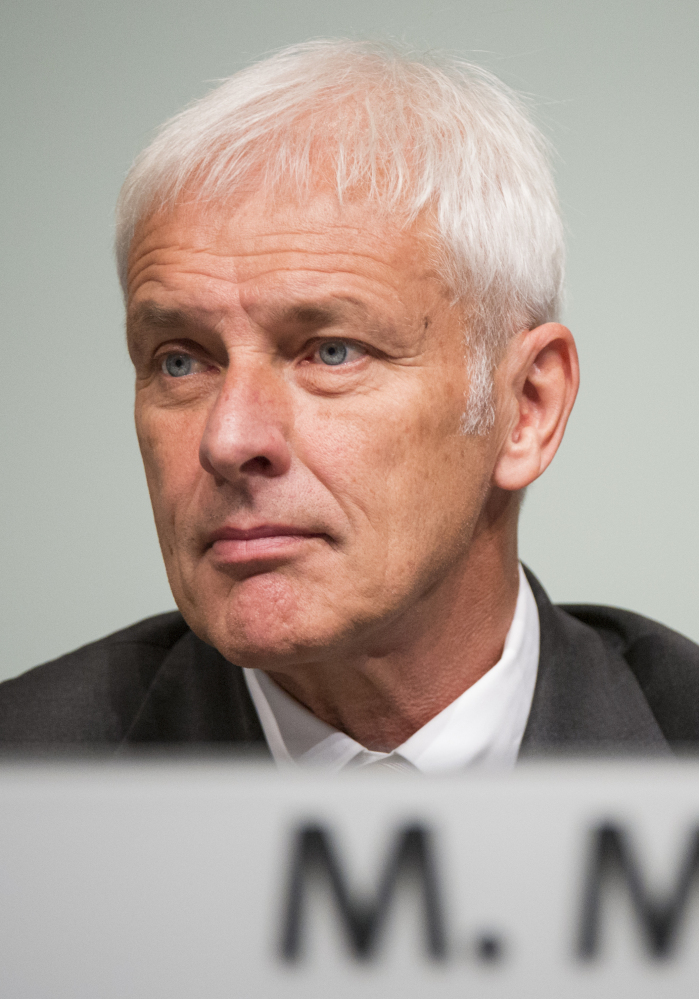Volkswagen Chief Executive Officer Matthias Mueller offered little more than an apology as the German carmaker sought to appease disgruntled investors for the damages caused by the diesel-emissions scandal.
While Volkswagen vowed to shore up internal processes to prevent a repeat of the cheating, it offered little new insight into the origins of the crisis. The company also stopped short of committing to cut management pay, with Chairman Hans Dieter Poetsch promising merely to “review” remuneration policies.
“What’s done cannot be undone,” Mueller said Wednesday in a speech prepared for the first shareholder meeting since the scandal erupted in September. “What does lie in our power is ensuring we act in a responsible manner. This is our commitment to you.”
Institutional investors are taking a rare public stand at the gathering in Hanover, Germany, to grill management over their handling of the crisis. Poetsch, who served as chief financial officer when the cheating occurred, is hosting the meeting amid criticism about his direct move from executive to chief overseer. While investors were willing to look past the carmaker’s insular structure when the company was doing well, Volkswagen’s no longer getting a free pass with its shares down more than 20 percent since it admitted to rigging diesel vehicles to cheat on emissions tests.
“The corporate governance problem at VW starts with the supervisory board,” said Hans-Christoph Hirt, co-chief executive officer of shareholder advisory group Hermes Equity Ownership Services Ltd., citing a lack of independent members well-versed in the auto industry. “This is an exceptional situation, and we believe a special audit by external, independent investigators is needed to clarify what went wrong.”
Many professional investors are planning to opt against ratifying the actions of the management and supervisory boards. Rejecting the normally non-controversial agenda item would be tantamount to a no-confidence vote. Investors are also calling into question Volkswagen’s ability to carry out an honest investigation into the origins of the cheating.
German shareholder meetings can drag on for hours as investors are given the right to demand answers from management. Still, the protest at Volkswagen will be largely ceremonial. Most investors hold non-voting preferred shares, while the voting stock is mainly in friendlier hands.
The Porsche and Piech families, descendants of the creator of the VW Beetle, own 52 percent of the common shares. The German state of Lower Saxony holds 20 percent and has special rights, along with workers, that are enshrined in Volkswagen’s bylaws. That gives outsiders limited opportunity to influence the company, even in the wake of scandal.
“There are justifiable concerns about the company’s ability to investigate these matters internally and present their findings to shareholders in an impartial and transparent manner,” Institutional Shareholder Services said in a report, assigning Volkswagen the advisory firm’s lowest score for corporate governance.
Joerg Hofmann, head of labor union IG Metall and deputy chairman of the supervisory board, defended Poetsch, saying at the meeting that he is the only person who has the support of workers and enjoys the trust of Volkswagen’s major shareholders. Porsche SE, the holding company for the family’s stake, is sticking to its recommendation to exonerate Volkswagen’s management and supervisory boards.
Copy the Story LinkSend questions/comments to the editors.



Success. Please wait for the page to reload. If the page does not reload within 5 seconds, please refresh the page.
Enter your email and password to access comments.
Hi, to comment on stories you must . This profile is in addition to your subscription and website login.
Already have a commenting profile? .
Invalid username/password.
Please check your email to confirm and complete your registration.
Only subscribers are eligible to post comments. Please subscribe or login first for digital access. Here’s why.
Use the form below to reset your password. When you've submitted your account email, we will send an email with a reset code.